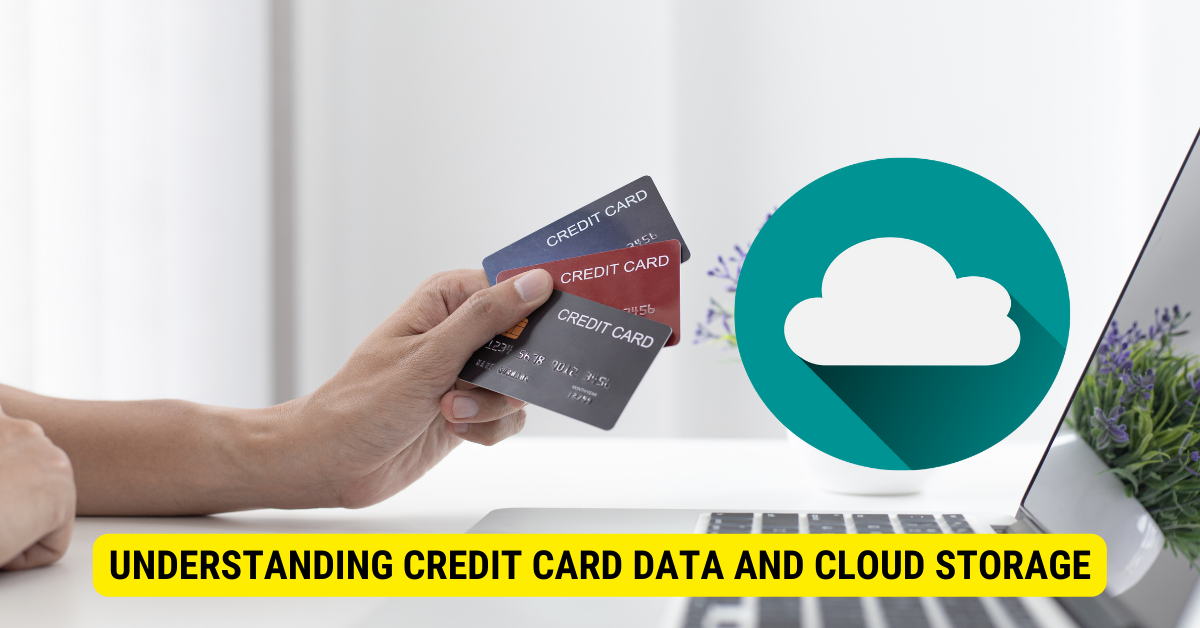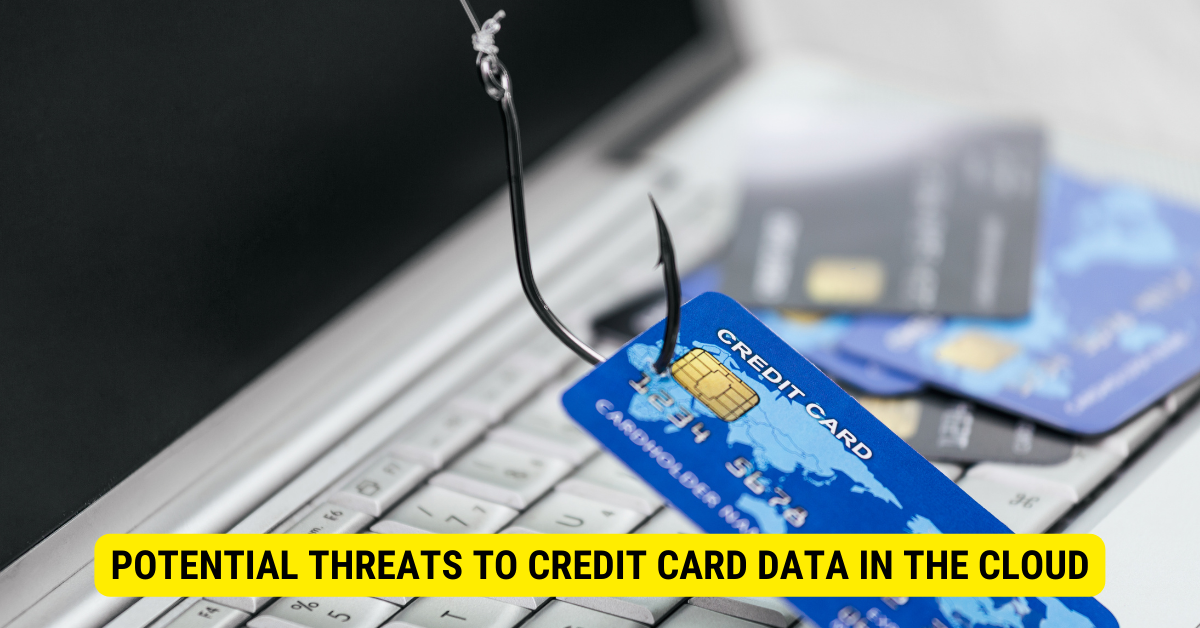The security of your credit card data in the cloud depends on various factors, such as the encryption methods used, the security protocols in place, and the reputation of the cloud service provider.
In today’s digital age, where data breaches and identity theft are all too common, it’s natural to wonder about the security of your credit card data. With the growing approval of cloud storage, many people are now storing their sensitive information, including credit card details, in the cloud. But is it safe? Let’s delve deeper into the subject and understand the intricacies of credit card data and cloud storage.
Understanding Credit Card Data and Cloud Storage

The Basics of Credit Card Data
Your credit card contains various data types that enable transactions and make online shopping a breeze. Primary information includes the cardholder’s name, card number, expiration date, and a three-digit CVV code. This data is vital for conducting transactions and needs to be stored securely.
When it arises to credit card data, security is of utmost importance. With the increase in online shopping and digital transactions, protecting this sensitive information from unauthorized access has become crucial. To safeguard the safety of credit card data, encryption techniques are employed. Encryption involves converting the data into a code that can only be interpreted with the right key. This way, even if someone expands access to the stored data, they won’t be able to make sense of it without the encryption key.
In addition to encryption, tokenization is another security measure commonly used for credit card data. Tokenization involves replacing the actual credit card data with a unique token identifier. This token is then used for transactions, while the actual card data is securely stored in a separate system. This way, even if a hacker manages to intercept the token, they won’t be able to use it to gain access to the original credit card information.
What is Cloud Storage?

Cloud storage, simply put, is an offsite service that allows you to store and access data over the internet. It eradicates the need for physical storage devices by providing remote server space. Popular cloud storage services include Dropbox, Google Drive, and Microsoft OneDrive.
Cloud storage offers numerous benefits, making it a preferred choice for individuals and businesses. One of the key advantages is the flexibility it provides. With cloud storage, you can access your data anywhere with an internet connection. This means you can make an effort on your files, view photos, or listen to music, regardless of your device. Your data is always at your fingertips, whether on your laptop, smartphone, or tablet.
An additional advantage of cloud storage is the ability to share files easily. Instead of sending large attachments via email, you can only share a link to the folder stored in the cloud. This saves time and reduces the risk of email overload and file versioning issues. Collaborating on projects becomes seamless as multiple operators can access and edit the same file concurrently.
Regarding security, cloud storage providers take extensive measures to protect your data. They employ encryption techniques to ensure that your files are stored securely. Additionally, reputable cloud storage services offer features like two-factor authentication and regular data backups to enhance your data’s security further.
Furthermore, cloud storage offers scalability, allowing you to expand your storage space as your needs grow easily. Whether you need a few gigabytes or terabytes of storage, cloud storage providers have flexible plans to accommodate your requirements.
In conclusion, credit card data and cloud storage are two important aspects of the digital world. Understanding how credit card data is stored securely and the benefits of cloud storage can help individuals and businesses make knowledgeable decisions regarding protecting their valuable information and accessing it conveniently.
The Security Measures of Cloud Storage
Cloud storage has become an integral part of our digital lives, permitting us to store and access our data anywhere. However, with the convenience of cloud storage comes the necessity for robust security measures to protect our sensitive information. This article will explore two key security measures cloud storage providers employ – encryption and multi-factor authentication.
Encryption and Its Role in Data Security
Encryption plays a crucial role in securing credit card data in the cloud. When you send your data to the cloud, it gets encrypted and converted into an unreadable format. This ensures that even if illegal individuals gain access to your data, they won’t be able to decipher it without the encryption key.
Cloud storage providers typically use advanced encryption algorithms to safeguard your information. These algorithms are designed to make it extremely difficult for hackers to break the encryption and access your credit card data. They employ complex mathematical calculations and cryptographic techniques to ensure the highest level of security.
Furthermore, encryption is not limited to data transmission. Cloud storage providers also encrypt your data while it rests on their servers. This means that even if someone breaches the data center’s physical security, they won’t be able to access your credit card data without the encryption key.
It is important to note that encryption is a two-step process. First, your data is encrypted using a unique encryption key. Then, the encryption key is encrypted using another key known as the master key. This double layer of encryption adds extra security, making it even more challenging for unauthorized individuals to decrypt your credit card data.
Multi-Factor Authentication for Additional Safety
Another security measure cloud storage providers employ is multi-factor authentication (MFA). MFA adds a layer of protection by necessitating operators to provide multiple forms of identification, such as a password, fingerprint, or a one-time code sent to their mobile device.
By implementing MFA, cloud storage providers ensure that even if someone gains your password, they still won’t be able to access your credit card data without the additional authentication factors. This significantly reduces the chances of illegal access to your sensitive information.
Moreover, MFA can also detect suspicious login attempts. For example, suppose someone tries to log in to your cloud storage account from a dissimilar device or location. In that case, MFA may prompt you to verify your identity through an additional authentication factor. This helps prevent unauthorized individuals from accessing your credit card data, even if they can obtain your login credentials.
Cloud storage providers often offer various options for MFA, allowing users to choose the authentication methods that best suit their needs. These options may include biometric authentication, such as fingerprint or facial recognition, and using hardware tokens or mobile apps that generate one-time codes.
In conclusion, encryption and multi-factor authentication are two essential security measures employed by cloud storage providers to protect your credit card data. By encrypting your data and implementing MFA, these providers ensure that your sensitive information remains secure, even during a security breach. So, the next time you store your credit card data in the cloud, you know these robust security measures protect it.
Potential Threats to Credit Card Data in the Cloud

Cyber Attacks and Data Breaches
Cyber attacks and data breaches pose a significant threat to credit card data stored in the cloud. Hackers are constantly emerging new techniques to breach security systems and gain access to complex information. Data breaches can result from vulnerabilities in the cloud provider’s infrastructure, weak passwords, or phishing attacks targeting users.
Internal Threats and Human Error
Internal threats and human error also contribute to the vulnerability of credit card data in the cloud. This can include accidental deletion of data, mishandling of encryption keys, or malicious behavior by insiders. While cloud providers implement security measures to mitigate these risks, remaining vigilant and adhering to best practices is essential.
How Cloud Providers Protect Your Credit Card Data?
Security Protocols Implemented by Cloud Providers
Cloud storage providers prioritize the security of your credit card data. They implement robust security protocols, such as firewalls, intrusion detection systems, and regular security updates. These measures protect your data from unauthorized access and are constantly monitored for potential threats.
Regular Audits and Compliance Checks
Cloud providers adhere to industry standards and undergo regular audits and compliance checks to ensure data security. They align their practices with regulations such as the Payment Card Industry Data Security Standard (PCI DSS) and the General Data Protection Regulation (GDPR). This reinforces the safety of credit card data stored in the cloud.
Tips to Enhance the Security of Your Credit Card Data in the Cloud
Strong Password Policies and Regular Updates
One of the simplest yet most effective ways to enhance the security of your credit card data in the cloud is to implement strong password policies. Choose unique passwords that are difficult to guess and regularly update them. Additionally, consider enabling two-factor authentication for an extra layer of protection.
Utilizing Advanced Security Features
Cloud storage services offer various advanced security features to protect your credit card data. These include data loss prevention tools that help identify and mitigate potential risks and activity monitoring to keep track of any suspicious activities. Explore and enable these features to further enhance the security of your sensitive information.
Key Takeaways
- Cloud storage solutions use multiple layers of encryption to secure data.
- Not all cloud providers offer the same level of security; choosing a reputable one is essential.
- Two-factor authentication and regular software updates enhance security.
- Compliance with security standards like PCI DSS is vital for credit card data.
- Data breaches can still happen, and monitoring your financial transactions is essential.
FAQs
Is my data encrypted in the cloud?
Typically, yes. Most reputable cloud services use strong encryption methods.
What is PCI DSS?
PCI DSS stands for Payment Card Industry Data Security Standard, a set of security standards to safeguard that credit card data is stored securely.
How can I enhance the security of my data?
Enable two-factor authentication and ensure your cloud service provider offers robust encryption and compliance with security standards.
Is my data safe with a free cloud storage service?
Free services might not offer the same level of security as paid ones. Always read the terms and security protocols.
What happens if there is a data breach?
In the case of a data breach, you should be notified by the provider and take immediate action, such as changing passwords and monitoring accounts.
Conclusion
As cloud storage continues to evolve, so do the security measures surrounding credit card data. While there are potential risks, cloud providers are continually working to ensure the safety of your information. By understanding how credit card data is stored and taking necessary precautions, you can confidently utilize cloud storage without compromising the security of your credit card data.
